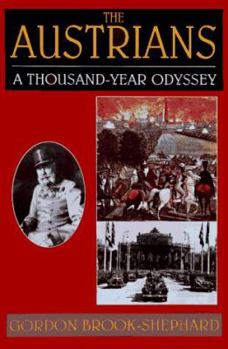The Austrians
Select Format
Select Condition 
Book Overview
A history of modern Austria makes use of the Habsburg's private family archives to trace the role of Austria in Europe's history since the Reformation and Austrians' identity as a people.
Format:Hardcover
Language:English
ISBN:0786704004
ISBN13:9780786704002
Release Date:March 1997
Publisher:Basic Books
Length:512 Pages
Weight:2.10 lbs.
Dimensions:1.6" x 6.5" x 9.6"
Customer Reviews
5 ratings
The Austrians: A Thousand-Year Odyssey
Published by Thriftbooks.com User , 17 years ago
Gordon Brook-Shepheard's books are always informative and interesting. This book has provided me with information I did not know.
A seminal work
Published by Thriftbooks.com User , 21 years ago
A seminal work of great magnitude but weak in its analysis of pre-20th century history. This book gives a whirlwind tour of Austrian History from 1200-1900. Then the book slows down and achieves greatness in describing the intricacies of Franz Joseph's rule as well as WWI and the road to Anschloss with Germany. The book picks up by describing the little know portion of Austrian history, the post 1945 Austria. At first divided between the major power Austria then became a `permanently' neutral power, although a power that hosted a controversial leader in the form of Mr. Waldheim, a former Nazi. The book then covers the `awakening' of Austria as it found itself post cold war. Although not up to date, it doesn't cover the election of the right wind Jorg Haider, this is an excellent introduction and survey of Austrian history. Seth J. Frantzman
Not perfect, but best overview of Austrian history avail
Published by Thriftbooks.com User , 23 years ago
English-language books on the long-term history of Austria are relatively rare. Admittedly, Austria was one of the most historically interesting places in the world during the latter part of Franz Josef's reign-dozens of interesting books are available covering events and movements encompassing the intellectual flowering of Wien beginning in the late Victorian period. Giant personalities in the fields of visual art, psychology, music, philosophy, literature and theatre could seemingly be found in every coffee house in turn-of-the century Wien. But judging from the available books, outside of the ever-busy Hapsburg family, little of interest to the rest of the world seems to have taken place before the last quarter of the 19th century. This is reflected in "The Austrians", which in spite of being a 483 page book, reaches the year 1866 by page 88. I think it would be fair to think of the book as more like a 140-year odyssey with a very long introduction.Outside of the short shrift given to early Austrian history, I found this an enjoyable and informative book. Austria is unique among modern European nations in having been for centuries the spiritual center of one of Europe's largest empires, yet it is now a relatively small country of relatively little influence on the world stage-the teutonic rump left over from the mostly-voluntary dissolution of a multi-ethnic dual-monarchy. Given this relatively short period in which to develop a sense of unique national identity, Brook-Shepherd attempts to show in his book how seminal events in Austrian history are either influential on today's sense of nationhood (however strong that may be), or are least illustrative of typical characteristics of Austrian culture or character. This is a difficult task, and I think the author is only partially successful.Still, it is a noble attempt, and although it sometimes feels as if the author is straining to make an obscure point about Austrian nationhood, in general, this doesn't really interfere with the book. The author has spent significant time in post-war Austria and has a number of interesting contacts both within what is left of the Hapsburg family and within the Austrian political sphere. He certainly cannot be blamed for taking use of these journalistic and personal contacts in substantiating his history, and unlike some reviewers, I did not feel that this was excessive-it did not distract from the flow of the book for me at all. I cannot say this about the excessive use of footnotes, which I found extremely distracting. Overall, I found this an enjoyable and informative book. In spite of some flaws, it is the best single-volume English-language source I've found on what is unfortunately, something of an obscure subject. I find it to be complementary to Andrew Wheatcroft's "The Hapsburgs." It takes a very different approach and they two books have relatively minimal overlap.
Excellent and comprehensive
Published by Thriftbooks.com User , 25 years ago
This is one of a number of books we purchased in preparation for a month-long journey to Austria (in the course of which we spent a delightful week with our exchange-student daughter's host family near Graz). Austria has played a central role in much of European history, and this book provides indispensable insights into the background of this fascinating nation. One can't begin to understand Austria today without some knowledge of its complex past. This book is indispensable for those who would really seek to experience Austria. We don't pretend to a lofty level of geopolitical wisdom, but this book helped lift us out of our American insularism. Our Austrian hosts were fascinated by it, and wanted their own copy.
Absolutely Superb
Published by Thriftbooks.com User , 27 years ago
One of the most comprehensive books on the intricate history covering the last 1,000 years of Austria. Short and to the point. Objective and not entering into speculative analysis of the "What If..? so often encountered in history books. I sincerely recomend it. Archduk Philipp of Austria





